“When you’re driving down a country road and you come across a fence post with a tortoise balanced on top, that’s a fence post tortoise. You know he didn’t get up there by himself, he doesn’t belong up there, he doesn’t know what to do while he’s up there, he’s elevated beyond his ability to function, and you just wonder what kind of dumb arse put him up there to begin with.”
The paradox of poverty in the midst of plenty – Part 5
LOVEMORE (Zimbabweans have interesting names), a regular reader of my column emailed me. “Hi Ken, have you heard of ‘Bond notes’ in Zimbabweâ€. He seemed apprehensive about them. He is scared and has lost confidence in the future. “You should not be scaredâ€, I wrote back. “Because you should have seen it coming.â€
The dilemma of some Zimbabweans is to think that you can plant a lemon tree and then harvest strawberries and oranges. The English say you reap what you sow. In Japanese we say ‘jigou jitoku’ which means just desserts. Life presents choices and we must decide. After deciding, we must live with the consequences. Every action we take has consequences, and we must live with them. If we are lucky, we must take remedial action to correct the outcomes of those choices.
Let’s look at an example: I run a transport business ferrying passengers from city A to city B. I hire Tanaka San as my driver on a one-year renewable contract. He drives this bus daily, but every month, the bus comes with something missing, a wing mirror, a headlamp, the ticket machine or steering wheel. On occasion he even has accidents which cost the business in repairs.
Meanwhile, I see Takana San prospering. He has suddenly bought himself a taxi and runs a side business. I do not ask him why he is prospering while my bus is incurring expenses suffered under his watch as the driver. Every year I keep renewing his contract. Then in year five, he crashes the bus due to incompetence and negligence. The insurance company gives me a new bus.
If I renew Tanaka San’s contract and give the new bus to him, my friends should wonder if I am smoking something unlawful. They would advise me to fire him. Why? Because I must not expect different results from the last five years. This is the situation Zimbabweans find themselves in continuing with the same mafia government and expecting different results. This is why I said to Lovemore, you should have seen it coming, because Zimbabwe has been down this road before. Let’s jump to the bond notes circus.
A hare-brained idea
The DC-based Atlantic magazine on May 6 had a story headlined “Zimbabwe’s Own U.S. Dollar Billsâ€. That headline paints the ridiculousness of the idea. But anything goes in Zimbabwe. Mangudya, who runs the Reserve Bank of Zimbabwe (RBZ), has announced the introduction of bond notes, which he claims are backed by a $200 million loan from Afreximbank.
Why Afreximbank would take a $200 million loan risk on Zimbabwe, in addition to another facility they provided to improve banking transactions last year is a question for another day. After realizing that his hare-brained innovation is causing panic, Mangudya has tried to “clarify†his announcement, adding that they will be issued to exporters as an incentive. This, he wants his countrymen to believe, will not affect the average person, but will affect the exporter.
The Zimbabwe Dollar is back
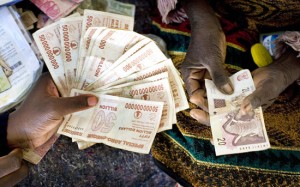 In August 2015, I wrote an oped entitled “Why 2016 will be far worse†(http://bit.ly/22Gyzvt ). I gave a gloomy prognostication of the Zimbabwean economy. Unknown to readers, I had used a computer simulation to project the Zimbabwean economy based on factors that are more or less constant. In my analysis, which I did not include in that article, I had determined that Zimbabwean managers would start implementing desperate measures at around this time, and they sure have. I also wrote of the same in January 2016 – you can find the article here (http://bit.ly/1Tx1CK0 ).
In August 2015, I wrote an oped entitled “Why 2016 will be far worse†(http://bit.ly/22Gyzvt ). I gave a gloomy prognostication of the Zimbabwean economy. Unknown to readers, I had used a computer simulation to project the Zimbabwean economy based on factors that are more or less constant. In my analysis, which I did not include in that article, I had determined that Zimbabwean managers would start implementing desperate measures at around this time, and they sure have. I also wrote of the same in January 2016 – you can find the article here (http://bit.ly/1Tx1CK0 ).
So what exactly is this bond note? Make no mistake about it, through these notes Zimbabwe is bringing the Zimbabwe Dollar back using a different name. As English author Shakespeare wrote, “a rose by any other name would smell as sweet”. I would hazard to say a skunk by any other name would smell as bad.
This is the trouble with the RBZ’s proposed bond notes. It’s the Zimbabwean dollar coming back cloaked under an Afreximbank facility which nobody has seen except the people that claim it exists. This is why the Atlantic magazine would say that Zimbabwe is printing its own US Dollar bills because it’s ridiculous to call them US dollars. It’s deceitful because currency is backed by real value, you can’t just make a claim that you are pegging your own notes to the USD that are not backed by known value.
It’s been heard of that currency can be backed by gold and other precious metals, but not backed by another currency. Never think that this new measure is the same as the bond coins one. As noted by the Atlantic article, other countries that have also adopted the US dollar as their currency such as Panama, Ecuador and East Timor have issued their own coins that are valued the same as American dimes, quarters, or nickels – nothing new; but the risk of those coins is minimal.
Currency bonded to some debt somewhere doesn’t exist in conventional economics – it has the potential to be some form of Ponzi scheme. Its fictitious, which is why its cloaked as an export incentive. You can’t take money deposited in genuine bank accounts and then exchange it for fictitious money.
It’s for Zimbabwean lawyers to explore if the bond notes and the forced exchange of US dollars for a softening South African Rand is lawful, but one would have to be an idiot to accept the Rand since it’s a soft currency and Mr. Zuma’s antics of lurching from one scandal to another will see it continue to see-saw. Therefore, a measure created at the whims and caprices of a political mafia, which has the effect of destroying the wealth of citizens is problematic from every perspective.
In the past, the same RBZ destroyed people’s wealth and lifetime savings through its actions. I doubt that anybody trusts the central bank in Zimbabwe, including the political mafia itself. Interestingly, the same “musketeers†who ran the central bank under Gideon Gono are still running it, with a new face – Mangudya.
The same people that destroyed value from 2004-2008 are still there – Charity Dhliwayo, Mirirai Chiremba, Normam Mataruka, Morris Mpofu among others. The same people who would steal foreign exchange from customer accounts cannot be trusted when they claim that a bond of equal value to the bond notes exists.
For the avoidance of any doubt, a judgment by Zimbabwean courts was issued against Standard Chartered Bank (SCB) in the case of Standard Chartered Bank Zimbabwe Limited versus China Shougang International for money stolen by the RBZ – (see my article about this on http://bit.ly/1Ntg4zj ).
So the grand question is: if the RBZ has been stealing money from private accounts, where did the money go, and can you trust it with anything? Does the so-called bond even exists? Who has seen it? Can they be trusted with printing money? Who will restrict them from printing more paper notes than are secured by the so-called bond?
A confidence game as much as it is a store of value
Currency value is a confidence game. There is not much other science to it. Mangudya has complained that the US dollar is overvalued in Zimbabwe, and that it is being used more as a store of value rather than a medium of exchange. This is foolish logic (an intended oxymoron). The two are not mutually exclusive. While money must both be a store of value and a medium of exchange, it follows that money must store value first before it’s acceptable as a medium of exchange. Otherwise, it goes the way of the Zimbabwean dollar.
In an oped published in the Sunday Mail of 8 August 2016, Mangudya, acknowledges a confidence deficit on the part of the organization he leads:
“I sympathise with the people of Zimbabwe who have taken our policy pronouncements to address the US dollar cash shortages to anticipate that we are going to have a repeat of the economic tragedy of 2008. What we went through in 2008 was difficult… As such, whenever we attempt to do anything, people immediately bring back horrors of that period. What I want to assure the nation is that things are not the same as 2008; we cannot have a repeat of that trauma. (underlined for my emphasis).
Mangudya admits that Zimbabwean people experienced “horrorsâ€, “traumaâ€, and “tragedy†in 2008. The engineers of the “horror†have not apologized for it, and the “horror†movie cast in government and at the RBZ (except Gono he replaced) remains the same. So why should they be trusted?
Now that you know that they are bringing back the Zimbabwe dollar cloaked as a bond note, what will happen? According to Mangudya’s second explanation, the bond notes, or Zimbabwe dollar, or whatever name given to them, will be used as an incentive to exporters. Assume Bulawayo Garments exports $10,000 worth of safety shoes to Germany. Instead of receiving the full amount in in dollars, the RBZ will give it $6 000, and the remainder in South African Rand and bond notes.
What you get as bond notes is real value which remains offshore sitting in someone else’s account. Just how this becomes an incentive to an exporter is so unclear that it’s mindboggling because the reason Zimbabweans are running away from other currencies in the first place is that they do not believe that those currencies are a good store of value and won’t make a fair medium of exchange.
So what happens when Bulawayo Garments receives the bond notes? It may choose to pay its workers with these notes because it can’t use them to import rubber for shoe soles. If local suppliers are comfortable with receiving the bond notes, they may take them, but since Zimbabwe is not producing enough locally anyway, all exporters like Bulawayo Garments will be forced to sell their bond notes for US dollars when they need to import anything. This will create a parallel market in the bond notes as one would be a fool to use the banks whose official line will be the bond note is equivalent to the US dollar – itself a fictitious proposition no different from North Korea just waking up and declaring that its Won is now equivalent to the US Dollar.
Once bond notes are being traded for real dollars, the store of value perception which Mangudya is running away from will be reinforced as people would rather keep their real dollars as a store of value, and dispense with the bond notes in transactional processes if there is anyone willing to accept them. When this cycle continues, then nobody will care about Afreximbank’s supposed $200 million “facility†hidden somewhere in a foreign land – and the bond notes will assume a value of their own based on the perceptions of those selling and buying them.
So voila! – the Zimbabwe dollar is back in another name. Of cause, this will not start at the 2008 levels because the 2008 trauma, ghost, horror or whatever else Mangudya wants to call it was an evolution of decisions that were made as early as the year 2000 followed by the issue of travellers checks and then the infamous bearer checks. So the bond note will evolve. Keep watching, and be diligent.
Kaden rika is a Japanese saying which means that if you are found stepping in a melon field or under a plum tree, such conduct causes misunderstanding that you want to steal those fruits – as such always avoid conduct that can be easily taken in bad faith. There is a lack of good faith in the RBZ’s actions.
So what brought Zimbabwe here?
It’s is leadership problem. We have a saying “akusai wa hyaku-nen no fusaku†which literally means “a bad wife spells a hundred years of bad harvest.†There is a thinking deficit at the upper levels of the Zimbabwean government establishment. The rot actually starts at the level of the President. Zimbabweans made wrong choices electing a 92-year-old as their Chief Executive. It was an unprecedented choice. I am not aware of any other country that has done it before.
My maternal uncle, a very intelligent man, is 87. At that age, I would never trust him with running anything, not even an izakaya (Japanese pub). Zimbabweans made choices that will haunt them for a while. You may argue that you did not vote for Mugabe, but through action or non-action, you are complicit in keeping him there to your own detriment.
Every country earns foreign money from selling goods or materials it produces to other countries. The selling country gets paid in a currency it has confidence in. When a country exports and imports, at a certain point, it has a balance which can be negative if exports are less than imports, and positive if imports are less than exports. Economists’ fancy term for this is “balance of tradeâ€. In Zimbabwe’s case, it is exporting less than its importing. There are various reasons for this.
Let’s quickly dispense with International Banking 101. Banks in different countries have relationships with one another to facilitate international trade. Through bilateral agreements, a bank can open an account with a correspondent bank in another country, called a correspondent account so that the latter can receive domestic currency on its behalf. This is because it is logistically difficult to shuttle bank notes from one country to another.
Through a correspondent account, a foreign bank can pay or be paid in domestic currency. This correspondent account is either a Vostro or Nostro account (Italian words: on account of the fact that the bookkeeping by banks was largely shaped in Italy by the Italian House of Medici in the 15th century). Simply put, Bank A can have an account with Bank B which it will call a nostro, whereas Bank B calls it a vostro.
Because of the logistical challenge of moving domestic currencies to another country, banks work out an exchange rate based on real and perceived value. In the Zimbabwean situation, if Bulawayo Garments which banks with Barclays, for example, sells safety shoes to Ford Motor Company in the USA which banks with JP Morgan Chase, JP Morgan will deduct the invoice amount and add it to the Barclays’ Nostro sitting in its books. With that money added to Barclays’ Nostro in New York, Barclays will credit Bulawayo Garments’ account in Bulawayo with the same amount in local currency. If Bulawayo Garments wants to pay a Germany supplier for rubber, Barclays will pay from its Nostro at JP Morgan. In simple terms, this how this works.
It is clear from the above that nostros are replenished through foreign trade. Zimbabwe through the actions of its own leaders consigned the Zimbabwe dollar to the graveyard in 2008. It now has to endure the logistical hassle of not just handling nostros as explained above, but also physically withdraw cash from the nostros and ship it to Zimbabwe.
Nostro accounts can be replenished when (i) a country exports more than it imports (ii) its citizens abroad send money home and (iii) foreign investors invest in local companies. Points (i) and (iii) are not working as they should because of the Zimbabwean government’s actions and policies; and point (ii) is working largely because of the consequences of an incompetent government.
Let’s explore this further. As CEO of Zimbabwe, Robert Mugabe disclosed that roughly $15 billion worth of diamonds were stolen under his watch. It could be more. No one has been arrested. The money has not been found. This means that the diamonds looted were not accounted for using the Nostro/Vostro process explained above – meaning that the diamonds did not replenish the nostro accounts from which banks are supposed to import the US dollar cash that Zimbabwe needs. When that happens, you run out of cash, and productive time is lost through idling in cash queues the whole day. As a matter of fact, the stolen $15 billion diamonds if recovered can immediately reverse Zimbabwe’s negative balance of trade and wipe out the cash problem.
Yet there are many other scenarios. Zimbabwe issued $600 million worth of tenders to dodgy companies with dodgy track records in developing power plants fronted by convicted criminals. A dodgy company is awarded a tender to build a power plant at a tender value of $171 million. Suddenly all the crooks, including the employees of the power company get interested, and they manipulate the system and announce that they will sign a deal but the price has increased from $171 million to $202 million, and suddenly the price has gone up by $31 million. The inflated tender is awarded to a company funded by a foreign bank, which means that an extra $31 million in nostros will be used to pay the dodgy company.
In a similar case, SynoHydro bids to build Kariba South Power Plant and wins the tender valued at $355 million after the scrapping of duty on equipment imports. This is when the energy ministry is under a minister from the opposition. As soon as the people of Zimbabwe make the mistake of trusting Mugabe with the sole charge of the economy after the 2013 elections, the crooks, without shame, inflate the tender value by nearly 60% to $533 million, this time under a new minister going by the name Mavhaire, overinflating the originally agreed costs by $178 million which eventually has to be paid from the ever-depleting nostros.
You can go on and on and include the $144 million tender for the Harare water project. These are just tips of the iceberg. The aggregate levels of the chicanery run into several billions. That will show you the extent to which a mafia leadership has ruined the balance of trade. The Zimbabwean government is more notorious for importing luxury cars worth millions of dollars than investing the same millions as export incentives to companies. Add to that the effects of lack of investment in local production and you will see a scenario that is more grave that you thought.
Let’s look at the foreign direct investment dimension. After the stability provided by the unity government, investors panicked and stopped moving money into Zimbabwe, a clear note of no confidence in Mugabe and his government. As fate may have it, the ruling party wasted no time in proving them right, and jumped straight into factional infighting inspired by wanton looting of state resources.
But more poignant are the activities of the underwear faction led by Mugabe’s wife. One of this faction’s number is none other than one Patrick Zhuwao who over the last few months invested all his energy in literally chasing away foreign investors from Zimbabwe. No foreign direct investment, no inflows into nostros, hence cash shortages.
How can the cash shortages be solved?
It is not rocket science to solve Zimbabwe’s problems. It requires honest, selfless and sincere leaders to build a culture of honesty and inspire everyone to work for the country. To solve this challenge, understand the issues highlighted above and focus on growing (i) exports more than imports (ii) remittances from citizens abroad and (iii) foreign direct investment. Anything short of this, will not work and the problem will never be solved by introducing bond notes.
So what will happen
Now that we have called the bond notes for the Zimbabwe dollar that they are, what will happen? In a short two years, Mugabe and his mafia have reversed every growth trajectory Zimbabwe was on before 2013. But they need power, and they will do anything no matter how destructive for its sake. With so many stakeholders including state-entity employees and government employees owed money, as Zimbabwe moves towards the next elections, expect lots of desperate measures anchored on electioneering, no matter how destructive they are. This is the context in which these bond notes have come about.
Is Mangudya a sincere man? He probably is. But you must not care about his sincerity, worry about that of the people who put him in that job. He is what Europeans would call a fencepost tortoise. If you don’t know what that is, here is a tale of an old farmer advising a doctor:
“When you’re driving down a country road and you come across a fence post with a tortoise balanced on top, that’s a fence post tortoise. You know he didn’t get up there by himself, he doesn’t belong up there, he doesn’t know what to do while he’s up there, he’s elevated beyond his ability to function, and you just wonder what kind of dumb arse put him up there to begin with.â€
This is why Mangudya himself cannot completely explain what and how these bond notes will work even after making such a significant announcement.
And one more thing – Mugabe’s debts. Mugabe’s dairy company is up to the nostrils in debt. It’s a troubled business and a headache for the 92-year-old and a wife who has to check her hands before figuring out the left from the right. This company was built from stolen funds, including Gono’s activities on the parallel market. The US dollar environment is proving to be a serious challenge for him and other crooked elements. There is a strong incentive to bring the Zimbabwe dollar under cover.
Once the bond notes are in vogue, what will Mangudya say if an army general says we want some of those to pay soldiers? Remember pre-2008 started with traveller’s checks, then bearer checks followed by strings of zeroes. Be diligent. With these “musketeers†in power, its heads they win, tails you lose. This time don’t be caught sleeping.
Ken Yamamoto is a research fellow on Africa at an Institute in Tokyo. He researches and travels frequently between Uganda, Kenya, Rwanda and Zimbabwe. Email your views to yamamotokensan@gmail.com
Post published in: Economy



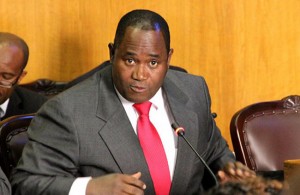
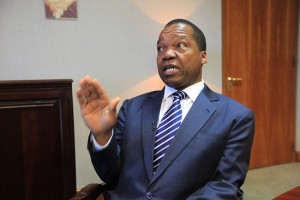
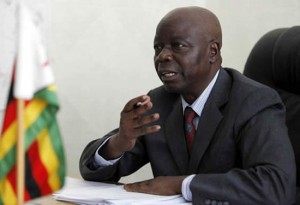
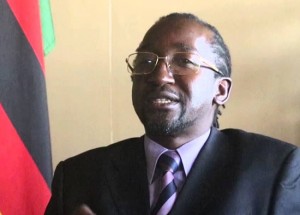
Yes Zimbabweans should have seen the economic meltdown coming but the truth is we did not. We are not just asleep but in a vegetative comatose state! We have been fast asleep for the last 36 years and the years of mental inactivity has forced our brain cells to turn into fatty tissue. We are a nation in which the majority are brain-dead zombies!
How was it possible that an intellectual like Dr Mangudya could be talked into adopting and defend policies that defy common sense; now with the policies collapsing he is made to look really stupid and helpless, a tortoise stuck up fence post! Anywhere else in the world not even a village idiot would have agreed to be a tortoise stuck up a fence post; Mangudya did because, forget his university degrees and PhD, he is brain-dead!
“This time do not be caught sleeping!” you warned. Your warning has come too, too late for the millions now brain-dead!